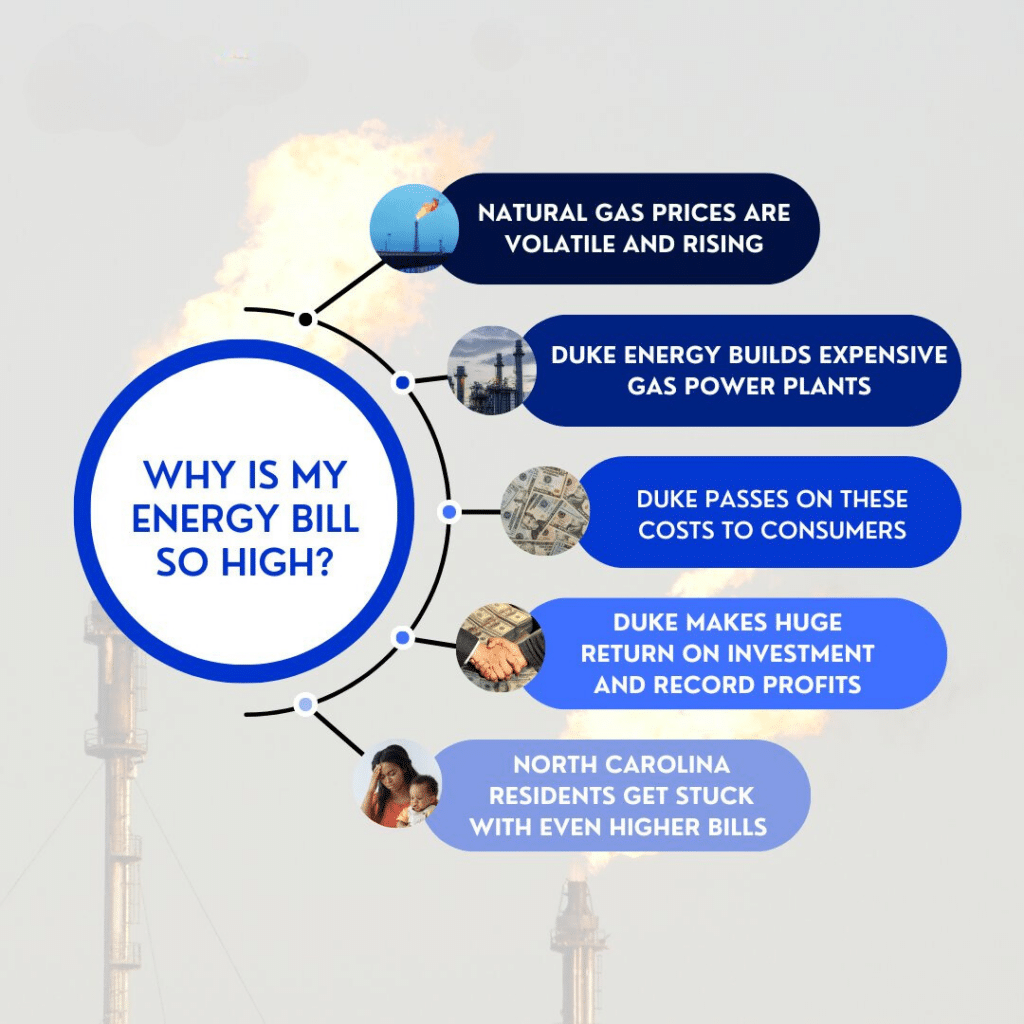Stop Duke's Greed
Giving Duke a Blank Check
The NC legislature is currently considering a proposal that will allow Duke Energy to bill ratepayers for power plants while they are being constructed, before they ever produce electricity. The same concept was used in South Carolina and Georgia, leading to huge cost overruns and higher bills for customers.
In South Carolina, a nuclear plant ran up $9 billion dollars in costs and was never completed! Ratepayers in South Carolina are still on the hook for these costs and will be paying for them for years to come. A SC Republican legislator and a former judge and SC utilities commissioner have urged North Carolina not to go down this path. Tom Erwin, the former SC judge and utilities commissioner described the law as a “blank check” to utilities.
In Georgia, similar legislation made ratepayers responsible for paying for construction and cost overruns. The two plants finally went online last year “about seven years behind schedule and $16 billion over budget.” Once again, ratepayers will be paying for this with higher rates for years.
Duke isn’t currently planning to build nuclear plants in the near term. However, they have proposed multiple dirty methane gas plants. So North Carolinians will be subsidizing additional dirty gas, rather than clean, affordable renewable energy.
What This Means for You
Higher energy bills. More pollution. That’s what happens when a greedy monopoly utility operates without appropriate oversight.
Background on the Carbon Plan
By law (HB 951), Duke Energy is required to put forward a carbon reduction plan every two years that provides the lowest cost and most reliable energy possible, while achieving a seventy percent (70%) reduction in emissions of carbon dioxide (CO2) emitted from electric generating facilities owned or operated by electric public utilities from 2005 levels by the year 2030 and carbon neutrality by the year 2050.

What is the lowest cost and most reliable way to meet the requirements of the law? More clean, renewable energy and battery storage.
A study Duke commissioned from the National Renewable Energy Laboratory revealed that Duke could most economically meet the carbon reduction targets mandated by the law by tripling the proposed solar on its grid by 2030.
Instead, Duke plans the largest buildout of dirty fossil gas in the nation1, along with incredibly expensive, unproven, small modular nuclear reactors2. Why?
The More Duke Spends, The More Duke Makes


REFERENCES
- https://www.sierraclub.org/sites/default/files/2024-02/2719%20NC-Factsheet%2005_web%20%281%29.pdfhttps://nclcv.org/cib11202023-small-modular-reactor/https://www.theassemblync.com/environment/duke-ratepayers-clean-energy/?
- https://nclcv.org/cib11202023-small-modular-reactor/
- https://www.theassemblync.com/environment/duke-ratepayers-clean-energy/?utm_medium=email
- https://www.wfae.org/energy-environment/2023-03-01/duke-energy-seeks-big-rate-increase-in-central-and-western-nc-to-cover-higher-fuel-costs
- https://www.bizjournals.com/charlotte/news/2024/02/08/duke-energy-2023-earnings-2024-growth-utilities.html
- https://www.wsoctv.com/news/local/duke-energy-ceo-lynn-goods-pay-package-2022-up-nearly-30/YDMVDKDUFFA2ROGRZ3L6S3NM2M/